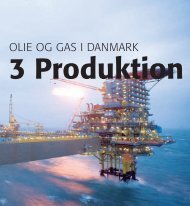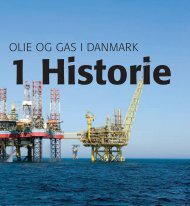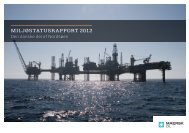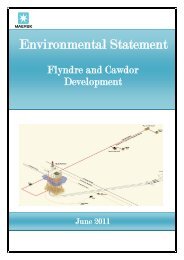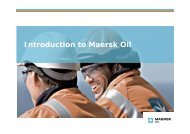Environmental Statement - Maersk Oil
Environmental Statement - Maersk Oil
Environmental Statement - Maersk Oil
Create successful ePaper yourself
Turn your PDF publications into a flip-book with our unique Google optimized e-Paper software.
Production Phase<br />
<strong>Environmental</strong><br />
Aspect<br />
Source<br />
Emissions to air Flaring of Balloch<br />
reservoir fluids<br />
B ‐ 8<br />
Diesel spills Accidental spillage during<br />
bunkering operations and<br />
rupture of diesel tanks.<br />
Activity<br />
Description<br />
Flaring occurs during<br />
emergencies and blowdowns.<br />
No increase in flaring is<br />
anticipated with the additional<br />
production on the GPIII FPSO<br />
Venting Increased venting required as<br />
Balloch will result in increased<br />
production and frequency of<br />
tanker offloading. The exhaust<br />
gases are diverted into the fuel<br />
tanks prior to loading with oil.<br />
Impacts depend on spill size, prevailing wind, sea state &<br />
temperature & sensitivity of environmental features affected.<br />
Birds are most sensitive offshore receptor. Also affected are<br />
plankton, fish/fisheries, seabed animals & marine mammals.<br />
Affect also on amenity value, property (e.g. vessels in<br />
marinas) & commercial interests.<br />
Likelihood Consequence Risk<br />
2 1 Low<br />
Potential effects and significance of potential impacts<br />
Flaring may contribute to climate change (CH4, CO2),<br />
acidification effects (SOx, NOx) and potential localised smog<br />
formation (VOC, NOx and particulates).<br />
Likelihood Consequence Risk<br />
2 1 Low<br />
Releases greenhouse gases into the environment, these gases<br />
were derived from combustion gases (CO2). Venting gases<br />
contribute to greenhouse warming.<br />
Likelihood Consequence Risk<br />
4 1 Low<br />
Balloch Field Development <strong>Environmental</strong> <strong>Statement</strong><br />
Trained deck operations<br />
personnel. Diesel storage tanks<br />
and transfer hoses are subject to<br />
inspection & engineering<br />
maintenance strategy. Bunded<br />
storage tanks. OPEP is<br />
implemented in the event of a<br />
spill as per Emergency Response<br />
Process. <strong>Oil</strong> spill modelling<br />
completed as an integral part of<br />
OPEP.<br />
Mitigation of impacts and actions<br />
to address concerns<br />
Rapid dispersion and reduction to<br />
background levels. Compliance<br />
with Flaring Consent. Minimum<br />
start up frequency, adherence to<br />
good operating practices,<br />
maintenance programmes &<br />
optimisation of quantities of gas<br />
flared.<br />
UK and EU air quality standards<br />
not exceeded.<br />
Engines are maintained properly<br />
to ensure optimal fuel<br />
combustion for venting gases and<br />
minimise release of gases with a<br />
high global warming potential<br />
such as methane.<br />
Appendix B ‐ <strong>Environmental</strong> Assessment<br />
None envisaged diesel<br />
should rapidly evaporate<br />
and disperse, diesel<br />
evaporates contribute are<br />
a form of greenhouse<br />
gases.<br />
Residual impact and/or<br />
concern<br />
None envisaged as<br />
contribution of emissions<br />
to worldwide levels is<br />
negligible when<br />
compared to other<br />
industrial sources.<br />
Increase global<br />
greenhouse emissions.<br />
Low impact.




